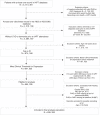Psychological therapies for depression and cardiovascular risk: evidence from national healthcare records in England
- PMID: 37072130
- PMCID: PMC10163979
- DOI: 10.1093/eurheartj/ehad188
Psychological therapies for depression and cardiovascular risk: evidence from national healthcare records in England
Abstract
Aims: People with depression are up to 72% more at risk to develop cardiovascular disease (CVD) in their lifetime. Evidence-based psychotherapies are first-line interventions for the treatment of depression and are delivered nationally in England through the National Health Service via the Improving Access to Psychological Therapy (IAPT) primary care programme. It is currently unknown whether positive therapy outcomes may be associated with cardiovascular risk reduction. This study aimed to examine the association between psychotherapy outcomes for depression and incident CVD.
Methods and results: A cohort of 636 955 individuals who have completed a course of psychotherapy was built from linked electronic healthcare record databases of national coverage in England: the national IAPT database, the Hospital Episode Statistics (HES) database, and the HES-ONS (Office of National Statistics) mortality database. Multivariable Cox models adjusting for clinical and demographic covariates were run to estimate the association between reliable improvement from depression and the risk of subsequent incidence of cardiovascular events. After a median follow-up of 3.1 years, reliable improvement from depression symptoms was associated with a lower risk of new onset of any CVD [hazard ratio (HR): 0.88, 95% confidence interval (CI): 0.86, 0.89], coronary heart disease (HR: 0.89, 95% CI: 0.86, 0.92), stroke (HR: 0.88, 95% CI: 0.83, 0.94), and all-cause mortality (HR: 0.81, 95% CI: 0.78, 0.84). This association was stronger in the under 60 compared with the over 60 for all outcomes. Results were confirmed in sensitivity analyses.
Conclusion: Management of depression through psychological interventions may be associated with reduced risk of CVD. More research is needed to understand the causality of these associations.
Keywords: Cardiovascular disease; Coronary heart disease; Depression; Electronic healthcare records; Evidence-base psychological therapies; Primary healthcare; Stroke.
© The Author(s) 2023. Published by Oxford University Press on behalf of the European Society of Cardiology.
Conflict of interest statement
Conflict of interest C.E.B., J.S., and A.J. are supported by the Alzheimer’s Society (AS-PG-18-013). J.E.J.B. is supported by the Royal College of Psychiatrists. C.E.B. has been a statistical consultant to Eli Lilly and Company in an unrelated role. R.S. held unrelated honorary position with NHS England, time was compensated through financial support to employing institution. J.S. has been a consultant to NHS Wales Shared Services Partnership and is involved in unrelated research projects funded by NIHR Public Health Research, Dunhill Medical Trust, and ESRC/NIHR.
Figures




Comment in
-
Successful psychological treatment of depression and subsequent reduction in CVD events.Eur Heart J. 2023 May 7;44(18):1663-1665. doi: 10.1093/eurheartj/ehad173. Eur Heart J. 2023. PMID: 37072131 Free PMC article.
References
-
- United Nations . The 2030 agenda for sustainable development. UN General Assembly; 2015 21 October 2015. Report No.: A/RES/70/1 Contract No.: A/RES/70/1.
-
- Correll CU, Solmi M, Veronese N, Bortolato B, Rosson S, Santonastaso P, et al. . Prevalence, incidence and mortality from cardiovascular disease in patients with pooled and specific severe mental illness: a large-scale meta-analysis of 3,211,768 patients and 113,383,368 controls. World Psychiatry 2017;16:163–180. 10.1002/wps.20420 - DOI - PMC - PubMed

